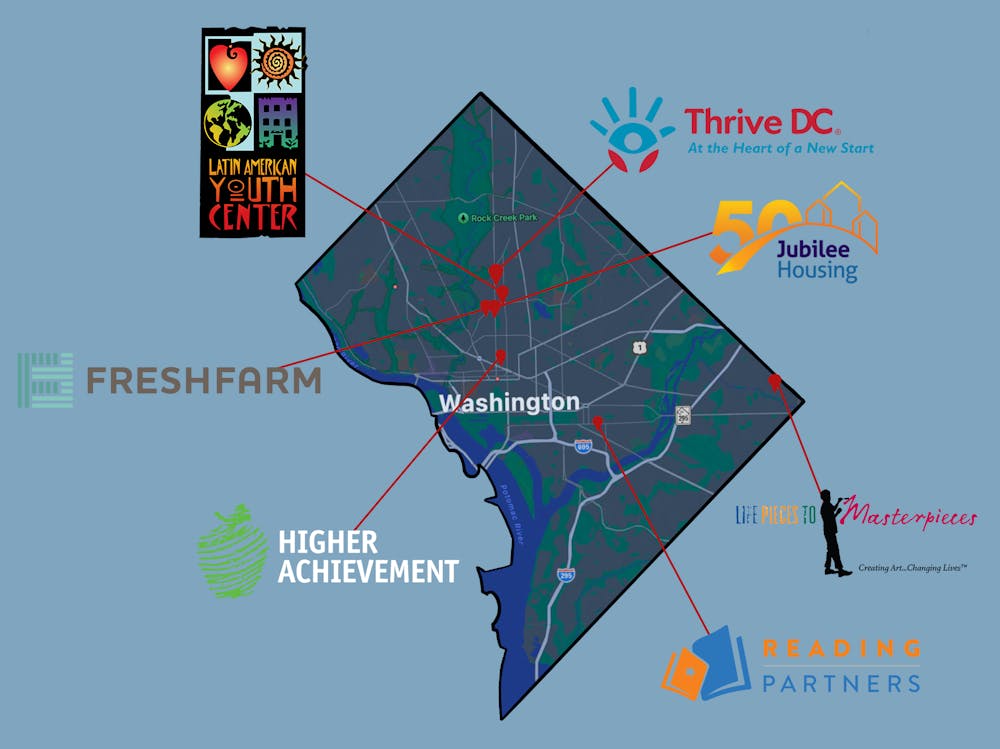Students use money to buy coffee, books, Ubers and clothes, making it easy to forget about the most important currency — time. Volunteering and giving back to the community is sometimes overlooked among internships and classes, but it’s where American University’s students excel.
Ava DeAngelis is a senior in the School of Public Affairs and School of Communication and also the Vice President of AU’s Alpha Phi Omega chapter working on their service community outreach. APO is AU’s service fraternity whose motto is “Be a friend, be a leader, be of service.”
“It’s nice to actually make an impact in the community you are in,” DeAngelis said, adding that while being a political science student has made her learn about the problems in D.C., it would feel like a “disservice” not to use the resources she has to tackle some of those problems.
“It is also important to highlight that the average college student may not have the time to spend on volunteering,” said Lily Slade, a junior in the College of Arts and Sciences. Slade is a member of AU’s Garden Club and works with FoodPrints, an organization that supports education, gardening and nutrition for the D.C. community.
“I can’t blame people for not being like, I’m gonna give my time for free, and I have like, 10 assignments to do, you know?” Slade said. “I feel like there’s a reason retired people volunteer more.”
Despite the extra time commitment, Priyanka Griffith, as a part of the CAS Leadership and Ethical Development Program, worked with the Ronald McDonald Foundation and found it “fulfilling to see it [progress] firsthand.”
Although the University’s culture places a hefty emphasis on internships, Griffith added how there should also be an emphasis on the volunteer work available to students.
“[Students should not be] afraid to just genuinely volunteer time to a cause without getting something for yourself out of it . . . and you’ll probably get something back in the long run, if not just, emotionally fulfilling,” Griffith said. “Not everything you do has to be for the résumé.”
With a campus surrounded by a flourishing community, charitable organizations are not slim. D.C. is home to a record estimate of 13,500 nonprofits. According to Governing, D.C. has one of the highest rates of locally-focused nonprofits.
Zoe Kramer, a senior in SPA and CAS, makes room in her schedule to work with Thrive D.C., a local food pantry, by pairing her community service work with an AU class through the Community Service-Learning Program.
Kramer, who works in the food pantry every Thursday, emphasized that both consistency and building relationships are critical for volunteers, adding that she has made it a priority to give back the time she is privileged to have.
Through this work, Kramer also said she experiences great fulfillment, especially in the relationships she has been able to build.
“Community-based work is a space for people from literally all over to come together,” Kramer said.
This article was edited by Sydney Hsu, Tyler Davis and Abigail Turner. Copy editing done by Luna Jinks, Emma Brown, Sabine Kanter-Huchting, Ariana Kavoossi, Ella Rousseau, Nicole Kariuki and Charlie Mennuti. Fact checking done by Hannah Paisley Zoulek and Sasha Dafkova.





